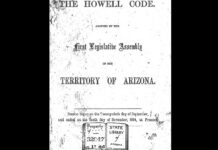For years, residents of the Village of Oak Creek have complained loudly about the lack of local control in their community as a whole. Most residences in the VOC are part of homeowners associations, which is an anomaly in Arizona. In most other communities, homeowners associations are a rarity, tucked into small developments by a single builder between other general housing projects. The exception are the giant, master-planned communities built by billion-dollar corporate home-builders.
These HOAs in the VOC wield varying levels of authority over members depending on bylaws and how their leaders use them, with the Village of Oakcreek Association — whose intentional spelling error has to be explained far too often — being the largest, a confederation of 25 of the 45 homeowners associations in the area.
But HOAs, being de facto private clubs and not legal governments, have their limits.
Likewise the Big Park Regional Coordinating Council, a group that attempts to consolidate ideas between many of the local HOAs and a few other groups also is not a government.
The BPRCC has no governmental or public authority, no public policy development or enforcement powers, receives no governmental or tax-based funding, was not established by a public body and its officials are not publicly elected.
Likewise, the Cornville Community Association is neither a government nor an association despite its name and leaders often claiming so. It is a nonprofit organization, structurally no different than a knitting club or art group, but pretends to wield power.
Certainly, leaders of VOA, BPRCC or the CCA can speak at Yavapai County Board of Supervisors’ meetings and claim to represent the views of others, but it is technically a legal fiction. These three groups are “ghost councils” whose power is based on illusion.
Several hotel and construction projects have come to the VOC in past years, which have rankled residents who want to stop them. Now there is a major housing development just north of Cornville and development projects along the commercialized stretch of Cornville Road that some residents there want to prevent.
Residents who oppose these projects have — to their own detriment — believed the fiction that these ghost councils perpetuate: That they have any power, and they have the power to halt any project.
So rather than work on real solutions to mitigate, negotiate, incorporate, ameliorate, inactivate, incapacitate or litigate a project, residents vainly put their faith in these feeble and impotent organizations and are shocked when their efforts fall flat and construction gets approved.
This is the future of both the VOC and Cornville if both communities choose to remain unincorporated. They can request aid from their county supervisor, but he or she is just one vote in five, and the three-member majority on the Prescott side of Mingus Mountain has very little concern about angering residents on this side who can’t vote for or against them in the next election. They examine what tax revenue these projects bring to the county, listen to some residents, then vote and move on.
Yavapai County is huge and 3,200 residents of Cornville or 6,400 residents of the VOC are merely 1.4% or 2.7% of the total 235,100 residents they serve.
CCA leaders point to their “community plan,” but it’s 15 years old and uses U.S. Census numbers from the Clinton administration. Yavapai County hasn’t asked for an update because officials don’t seem to care, which should be a warning sign to what county officials have in mind when they think of Cornville.
The VOC or Cornville could change this by annexation — but residents don’t want to join and existing cities and most city leaders don’t want to annex these areas either — or incorporate as a municipality.
As a town, communities control their own zoning, development goals, community plans and local growth.
The VOC has leaned more toward incorporation in past years, but numerous attempts have fizzled. Perhaps, some day, an organized effort will get incorporation on a ballot.
Conversely, Cornville residents bristle at the mere suggestion of incorporation. They also demand the county and neighboring towns preserve their independence and block new developments.
They can’t have it both ways.
Piecemeal annexation by Cottonwood or Camp Verde is inevitable. Open, taxable land is too tempting and elected officials are greedy to add more to their tax base. Cottonwood will soon likely annex a huge parcel including a portion Cornville residents claim is theirs — but there can be no territorial incursion if Cornville has no borders, sine qua non.
If Cornville residents do nothing but flail their arms and place all their hopes in an impotent club, the community will get carved up in the decades to come. Incorporation could stop this and give local control, but only if residents act. If not, expect more big projects to get the green light.
Christopher Fox Graham
Managing Editor






















